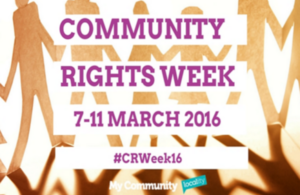Community Rights hit a landmark 5,000 uses
5,000 uses of community rights, including over 3,000 buildings, green spaces and other much loved local assets protected.

The Community Rights movement continues to go from strength to strength with latest figures showing more than 3,000 buildings, green spaces and other much loved local assets protected.
Local people are also having more of a say on what new developments should look like and where they should go with 1,800 neighbourhood plans now well underway.
To promote the programme, the government has produced an interactive map listing protected assets and other community rights uses throughout the country.
Speaking at the start of Community Rights week, Communities Minister Marcus Jones said:
From regulars taking over their local pub to ambitious local plans for new development, there is a growing movement of people up and down the country who are taking advantage of community rights.
Listing works best when it is used proportionately, but with over 5,000 uses of community rights, including 3,000 assets listed, the government is supporting local people who want to make their areas even better places to live and work.
Communities have a set of community rights powers. They include:
Community Right to Bid
This helps to protect treasured local community assets. Communities can nominate any local building or land they love as an ‘asset of community value’ and then, if it comes up for sale, they have 6 months to raise the funds to buy it.
More than 3,000 much loved assets are now listed including 1,200 pubs, over 150 local sporting assets, including football stadiums, bowling greens and cricket pavilions, right through to Blencathra, one of the Lake District’s best-known peaks.
Neighbourhood planning
Enables local communities to shape the places where they live and work. Residents are directly able to decide what type of development is needed, where it should go and what it should look like.
More than 1,800 areas are currently drawing up draft plans covering an estimated 9.6 million people, with more than 150 plans successful at referendum.
Community shares
Enable residents to invest financially in community projects. By buying shares and becoming part-owners of a business, local people can become supporters, volunteers and advocates, and projects get much needed funding to get started and become financially sustainable.
£50 million has been raised through community shares offers since 2012.
Our Place
Helps residents work together with councillors, service providers, businesses and voluntary and community organisations to solve local problems and improve local services.
Our Place ensures that public money is being spent in the ways local people want. Almost 200 projects are underway with millions of people now covered by the Our Place approach.
Tenant empowerment programme
Supports social housing tenants to engage in, manage or control local services. It provides training, funding and support that enables tenants to, for instance, manage a service, or take control of their housing through the Right to Manage.
People care about their neighbourhoods and want a say in how they evolve. Community rights are making this possible.
- the White Bull pub in the Ribble Valley has been listed as an asset by the community, the pub dates back to the 1700s and is now looking at a secure future
- Plymouth Argyle Football Club’s ground ‘Home Park’ has been listed by its’ fans as a Community Asset
- Beverley War Memorial Hall in East Riding was opened in 1959 as a memorial to the men and women of Beverley who fell in World War II. The much-loved community hall has been listed by local people as it’s often used for events such as Zumba classes and coffee mornings
- Portishead Town Council in North Somerset has listed their local Golf Course, which acts as a green centre for the community
- Winscombe Community Association has listed their community orchard
Locality, the national network of ambitious and enterprising community-led organisations, runs the My Community Help Centre on behalf of the Department for Communities and Local Government, with resources, inspiration and advice on the Community Rights, Neighbourhood Planning and Our Place.
Chief Executive Tony Armstrong said:
It’s great to see so many people taking the opportunity to help improve their neighbourhoods by exercising their community rights.
We know that people care deeply about where they live and we’re marking this fantastic take up by celebrating Community Rights Week this week and sharing more information about how people all over England can use the rights to make their neighbourhoods better places.
Further information
Want to get involved in your community? See the My Community Rights website for details on how to go about it.
Community rights are enshrined in law by the Localism Act 2011. The first rights came into force on 6 April 2012.
The interactive map shows:
- listed assets of community value
- designated neighbourhood planning areas
- Our Place
- community shares
The data on assets of community value is based on the information obtained from lists of assets of community value, published on local authority websites, where available, at the time of production.
If you have any queries please let us know by emailing righttobid@communities.gsi.gov.uk.
Office address and general enquiries
2 Marsham StreetLondon
SW1P 4DF
Contact form https://www.gov.uk/gui...
General enquiries: please use this number if you are a member of the public 030 3444 0000
If your enquiry is related to COVID-19 please check our guidance page first before you contact us - https://www.gov.uk/guidance/coronavirus-covid-19-guidance-for-local-government.
If you still need to contact us please use the contact form above to get in touch, because of coronavirus (COVID-19). If you send it by post it will not receive a reply within normal timescale.
Media enquiries
Email newsdesk@communities.gov.uk
Please use this number if you are a journalist wishing to speak to Press Office 0303 444 1209